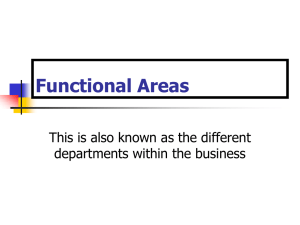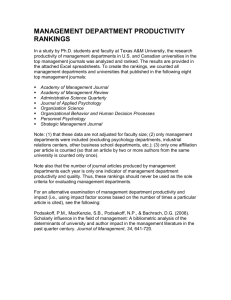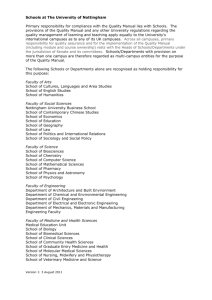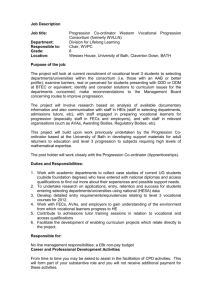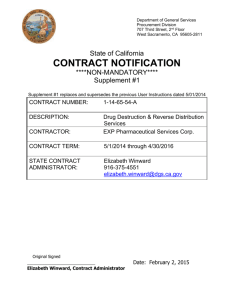Current departmental good practice to support progression
advertisement
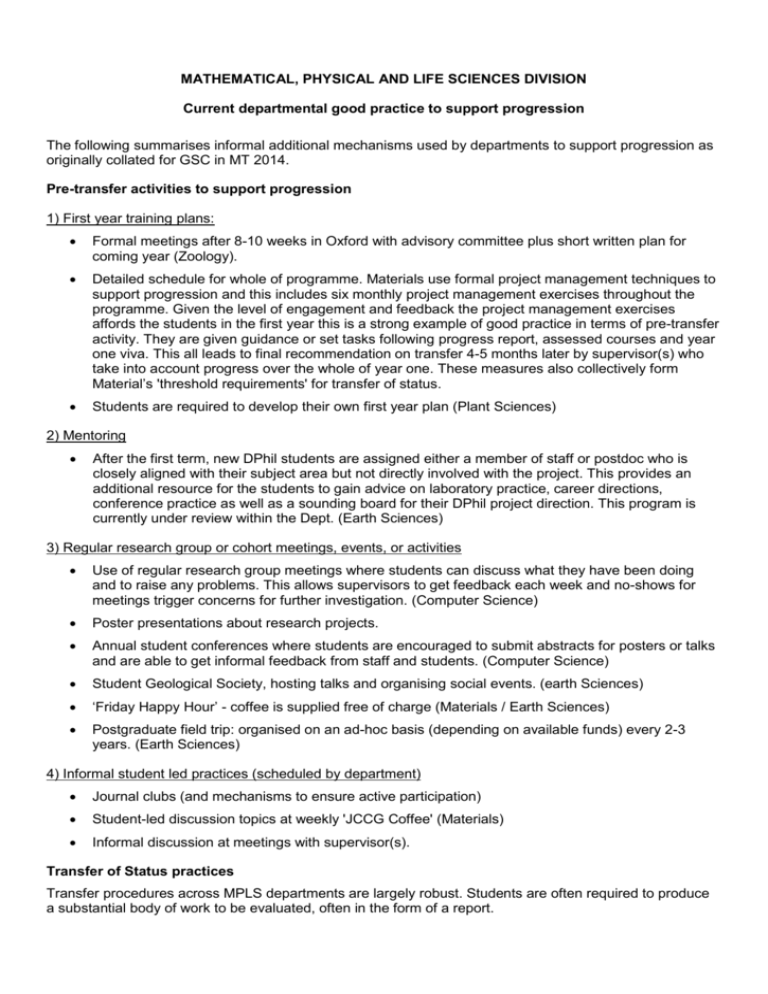
MATHEMATICAL, PHYSICAL AND LIFE SCIENCES DIVISION Current departmental good practice to support progression The following summarises informal additional mechanisms used by departments to support progression as originally collated for GSC in MT 2014. Pre-transfer activities to support progression 1) First year training plans: Formal meetings after 8-10 weeks in Oxford with advisory committee plus short written plan for coming year (Zoology). Detailed schedule for whole of programme. Materials use formal project management techniques to support progression and this includes six monthly project management exercises throughout the programme. Given the level of engagement and feedback the project management exercises affords the students in the first year this is a strong example of good practice in terms of pre-transfer activity. They are given guidance or set tasks following progress report, assessed courses and year one viva. This all leads to final recommendation on transfer 4-5 months later by supervisor(s) who take into account progress over the whole of year one. These measures also collectively form Material’s 'threshold requirements' for transfer of status. Students are required to develop their own first year plan (Plant Sciences) 2) Mentoring After the first term, new DPhil students are assigned either a member of staff or postdoc who is closely aligned with their subject area but not directly involved with the project. This provides an additional resource for the students to gain advice on laboratory practice, career directions, conference practice as well as a sounding board for their DPhil project direction. This program is currently under review within the Dept. (Earth Sciences) 3) Regular research group or cohort meetings, events, or activities Use of regular research group meetings where students can discuss what they have been doing and to raise any problems. This allows supervisors to get feedback each week and no-shows for meetings trigger concerns for further investigation. (Computer Science) Poster presentations about research projects. Annual student conferences where students are encouraged to submit abstracts for posters or talks and are able to get informal feedback from staff and students. (Computer Science) Student Geological Society, hosting talks and organising social events. (earth Sciences) ‘Friday Happy Hour’ - coffee is supplied free of charge (Materials / Earth Sciences) Postgraduate field trip: organised on an ad-hoc basis (depending on available funds) every 2-3 years. (Earth Sciences) 4) Informal student led practices (scheduled by department) Journal clubs (and mechanisms to ensure active participation) Student-led discussion topics at weekly 'JCCG Coffee' (Materials) Informal discussion at meetings with supervisor(s). Transfer of Status practices Transfer procedures across MPLS departments are largely robust. Students are often required to produce a substantial body of work to be evaluated, often in the form of a report. 5) Transfer talks or presentations are already widespread across MPLS, and in the main these offer the opportunity to address a broader group than just the Panel assessing the transfer which has the benefit of both testing the student’s understanding and giving them an opportunity to build their broader communication skills. Departments which do not already require peer or wider group presentation as part of the transfer process could consider doing so. 6) Engagement with skills training: While the transfer form requires students to list what skills training they have undertaken, the returns for departments do not always highlight this as something which they particularly focus on (the Earth Sciences return is a good example of where significant detail is given about training). If a focus on skills is not currently a robust element of consideration at transfer the Division would encourage departments to use this as an opportunity to ensure the student is well engaged with both academic and broadening research training; this is particularly important if the student is RCUK funded. 7) Personal development planning: Students can be asked to develop plans both to set out the timings for the key actions that they need to complete in order to see them through to submission, as well as to set out the skills they need to accumulate for their career after their doctoral programme. It is not clear from the information provided by departments whether or how this is currently managed. 8) Feedback for students on transfer performance: The majority of departments produce a written report on the transfer milestone. Some departments state that these are considered by their graduate committees. Sharing these with students would provide a further feedback mechanism for students (this was not clear from the information provided by departments). Between transfer and confirmation The period between transfer and confirmation is one where the student is expected to become increasingly independent as a researcher and therefore mechanisms to support progression should enable this development rather than provide students with a crutch. 9) Presentations, symposia, student conferences in year 2 and 3 Condensed Matter Physics (CMP): Close to the end of the second academic year, the students will present a poster to a CMP audience on an aspect of their research and answer questions. They will also attend a short interview with the DGS and the HoSD. Towards the end of their third year, the students will give a 20 minute presentation to a CMP audience and attend a short interview with the DGS and the HoSD. Usually the confirmation of status is subsequent to presentation and interview. Preparation and presentation of research poster, submission of thesis plan and outline of remaining experiments and an interview with assessment committee. Post confirmation: 6 months before statutory completion date an interview with the assessment committee to review progress on outstanding experiments and plans for production of thesis and submission, and career progression (Plant Science). Graduate Symposium: All third year DPhils are required to give a research presentation to Inorganic section (Inorganic Chemistry). Annual student conference where students are encouraged to submit abstracts for posters or talks and are able to get informal feedback from staff and students (Computer Science). Peer feedback on HT year 2 research talk and any concerns arising from talk raised by DGS in writing (Materials). Student-led discussion topics at weekly 'JCCG Coffee' (Materials). Poster in year two (Chemical Biology), presentation about research project in HT (statistics) 10. Additional formal meetings: Advisory committee meeting: students are advised to meet with their advisory committee and usually supervisor(s) in seventh term (Zoology)
